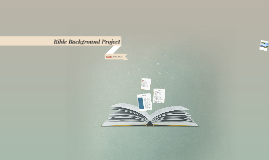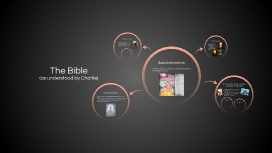King James Bible Presentation
Transcript: The King James Version: A Brief History 1604: King James I of England is having trouble with these guys... who aren't getting along with these guys... He calls a conference, so everyone can work out their problems. At some point,the conversation moves around to the subject of the Scriptures... specifically, English translations of the Scriptures. The Anglican Bishops prefer an English translation called The Bishops' Bible (of course they would). The Puritans are fond of the Geneva Bible, which has a whole lot of great notes... a kind of Study Bible. James doesn't care for the Geneva Bible, because lots of the notes are pretty critical of kings. And James is a big believer in THE DIVINE RIGHT OF KINGS. To try to keep the peace, the decision is made to create a NEW English translation of the Bible. One that will combine the best of earlier English versions, while remaining as true as possible to the original Greek and Hebrew texts. 47 scholars are chosen, almost all of whom are Anglican clergy. King James specifies, among other things, that the only notes allowed are notes that will clarify the text. (NO MEAN STUFF ABOUT KINGS ALLOWED!) Guidelines laid down for the translators effectively minimize the influence of the Puritans on the translation process. (As a result, the Puritan movement does not embrace the King James Version for many decades.) The new translation is mostly finished by 1609, and is printed for the first time in May of 1611. It becomes known popularly as the Authorized, or King James, Version. The title page of the KJV actually reads as follows: THE HOLY BIBLE, Containing the Old Testament, AND THE NEW: Newly Translated out of the Original tongues: & with the former Translations diligently compared and revised, by his Majesties special Commandment (Let's just call it "The King James Version"...) All that happened 400 YEARS AGO. So, what about the King James Version TODAY? For most of the 18th, 19th and 20th centuries, the King James Version was the single most popular translation of the Bible in the English language. And still, today, the KJV is considered THE BIBLE by many people. (Some even believe this as a point of doctrine!) As far as its status as a literary classic, the King James Version is unsurpassed. Most scholars of the English language consider the King James Bible to be the greatest monument of the English language, perhaps even greater than the works of William Shakespeare. Just a short sample of everyday phrases that come from the KJV will show its impact: "A house divided against itself cannot stand." "A thorn in the flesh" "A wolf in sheep's clothing" "Am I my brother's keeper?" "By the skin of your teeth" "Flesh and blood" "Give up the ghost" "Love of money is the root of all evil" (often misquoted) And many, many more! But...IS the King James Version the best English translation? Is it the only Bible a Christian should use? NO. No, to both of those questions. The translators of the KJV did the best possible job they could do, with the manuscripts they had available, and with their knowledge of the original languages. But today's Bible translators have literally thousands more manuscripts at their disposal, and understanding of Greek, Hebrew and Aramaic has increased vastly since the 17th century. Meanwhile, the English language has changed immensely since the Jacobean period. Forget the "thees" and "thous" that everyone complains about. (And the "begats.") In the KJV,"Suffer the little children" doesn't have anything to do with suffering, "fetch a compass" means "travel in a circle," and "charity" does not have anything to do with giving money to the poor. The KJV Translators spoke to this same issue in their wonderful Preface, "The Translators to the Reader." (Sadly, this Preface is not printed in most modern editions of the KJV.") They wrote: "But how shall men meditate in that, which they cannot understand? How shall they understand that which is kept close in an unknown tongue?" Quite simply, the best Bible for a Christian to use is one that he or she will read and UNDERSTAND. But the King James Version is a Bible that has stood the test of time, that has become a classic of English prose, and that hundreds of thousands of people still read and study daily. Will the New International Version the New Revised Standard Version, the Common English Bible, the Message, the Good News Bible, the New Living Translation, and a host of other modern translations still be around in FOUR HUNDRED YEARS? Only time will tell. Current Bestselling Bibles

















